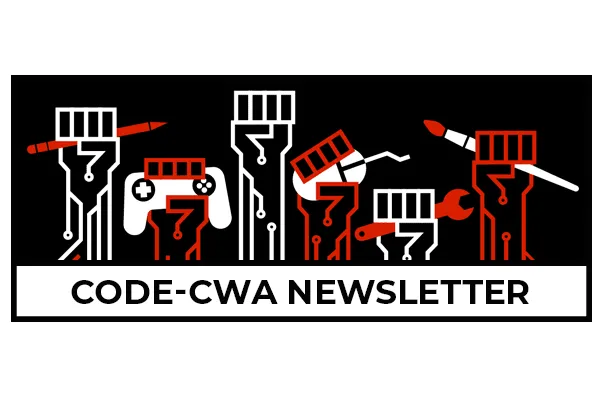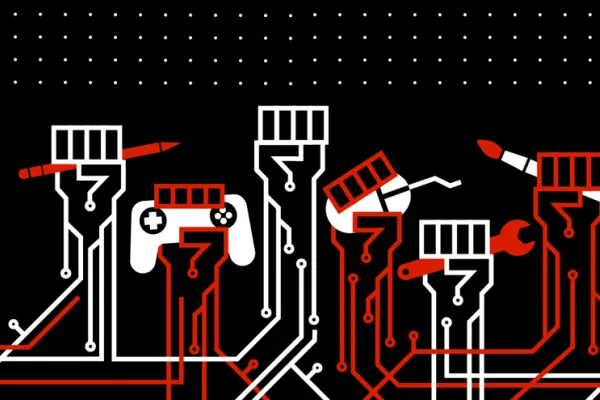CODE-CWA Newsletter Nov. 30

“We believe in an abundant future because of you.”
To keep in mind: The myth of the first Thanksgiving is a lie meant to erase the parasitic relationship between the early Puritans arrivals and the Wampanoag people. When the Puritans arrived, it was the Wampanoag people who greeted them with generosity and care. In response to the new and different strangers, they chose to share in the abundance of the land they had called home for generations, by teaching the Puritans how to plant and forage for food. This generosity was responded to with hundreds of years of genoicide and displacement. In fact, the first recorded mention of a “Thanksgiving” celebration occurred in 1637, when colonists celebrated their massacre of a Pequot village.
Today, as a pandemic of disease and greed ravage working communities, particularly communities of color, we can see the same through-line from that early interaction between indigenous people and white settlers— a continued denial of the abundance we are surrounded with so that a few can lay bad faith claims to profit, ownership, and power. The history of Thanksgiving reminds us of the function of erasure. It is meant to divide us from each other and deny us our part in the bountiful harvest that we’ve created.
This “Thanksgiving”, we reject the myth of scarcity that fueled accumulation of land and wealth among settlers. In the same way that settlers saw themselves as entitled to the common land and its wealth as part of this country’s “Manifest Destiny” we see tech as the new frontier of the struggle. We know that tech sells itself as the future, a future that knows no economic limitations and faces no problem it cannot solve through “innovation”. This story erases the lived experience of tech workers, the workers who pack Amazon boxes, the workers who monitor hateful social media posts, the workers who cook in cafeteria kitchens, the workers who are asked why a military contract is up for consideration and so much more. We know that there is enough for all workers to receive the autonomy, benefits and pay necessary to live an enjoyable and dignified life. We know that there is a way tech could truly be innovative if workers actually had ownership over their labor and work conditions.
The tech industry exists to automate existing forms of labor, and (in theory) make human life easier and more prosperous. However, under our current industry it leads to mass unemployment, the destroying of jobs, the exploitation of the land and environment, and more. Tech can be liberatory, it can free people from hard work to pursue their interests, but only if we, the workers, stand up and assert our own agency over our lives and our labor.
We encourage you to honor Thursday as a National Day of Mourning and Friday as Native American Heritage Day, study the history of these lands, and implement it into your work and organizing. Take the weekend to embrace the spirit of abundance on this land by engaging in collective action.
We're so grateful to continue to organize with you. We know that many of us will be isolating this holiday season so that the next time we gather with loved ones, no one is missing. So, while the season will look a little different for most of us, know that we’re thinking of you, and inspired by your commitment to the struggle.
We believe in an abundant future because of you.
Worker News
Amazon warehouse workers in Alabama file to hold a union vote. A union election petition was filed at an Amazon fulfillment center in Alabama by the Retail, Wholesale and Department Store Union (RWDSU). The notice was filed with the National Labor Relations Board as workers across the globe have raised concerns about COVID and warehouse work conditions. Workers are hoping to hold an election to create a bargaining unit that would include 1,500 full time and part time workers. The organizing campaign is not only hoping to secure better wages for workers, but also improve safety standards. This organizing is momentous as we consider what workers are up against: Right-to-work laws and a corporation dedicated to union busting. But as Professor Imani Perry reminds us, as goes the South, so goes the Nation. If Amazon warehouse workers in Alabama are gearing up for a fight, we know the spark has been lit. Read more from The Washington Post.
Even as organizing at Amazon warehouses strengthens, the company invests in new union busting technologies. Internal Amazon reports reveal the extensive efforts by Amazon to monitor organized labor, social and environmental movements in Europe, especially before their most profitable window from Black Friday to Christmas. By monitoring worker activity and social media, Amazon hopes to continue to clamp down on any worker organizing. Amazon has recently hired Pinkerton, a spy agency known for specializing in union-busting, to gather information on warehouse workers in particular. Amazon is clearly investing heavily to maintain their hold on the workers who most successfully drive the company: warehouse workers. It is the labor of these workers that allows Amazon to maintain its monopoly. But as history has taught us, even the world’s strongest monopolies can be forced to their knees in the face of organized worker power. Check out the full story in VICE: Motherboard.
Facebook workers in Irish are demanding stronger COVID-19 protections. More than 100 workers in Dublin, Ireland have publicly signed a letter asking for improved workplace protections during the COVID-19 pandemic. As Facebook continues to skirt responsibility regarding its use as a misinformation tool and hub for various types of hateful content, workers in Ireland are asking why they are being asked to risk their lives, and the lives of their coworkers and families, to maintain Facebook’s profits during the pandemic. Interested in learning more? Check out the rest of the story in the Irish Times.
After months of organizing, workers win COVID-19 protections in New Jersey. Eleven months into the deadly pandemic that is ravaging working communities, the governor of New Jersey finally signed an executive order mandating COVID-19 safety protections for workers in all New Jersey workplaces. It is disheartening to consider that such a basic step by elected officials was not enacted nearly a year ago. In spite of this, worker organizing came together when it was clear that both the federal and corporate response to the pandemic was lacking. Workers complained about getting verbal recommendations from management, while companies refused to provide safety equipment to workers. Hopefully, as cases rise across the country, these new protections will protect many workers and their families from the continued spread of the virus. This win is a reminder once again that action to benefit workers, will always be driven by worker organizing. Read more in New Brunswick Today.
This Week in Labor History
1170 BCE — The first strike in recorded history. In Deir el-Medina, an ancient Egyptian village, lived a mostly middle class community of artisans who worked on the tombs built in the Valley of the King from during the 18th to 20th dynasties of the New Kingdom period, ca. 1550-1080 BCE. Countless recordings give us detailed insight into the community’s inner workings. Deir el-Medina, or Set Maat as it was called then, was home to a diverse group of laborers that included stone-cutters, plasterers and water carriers, and decorators. This community was responsible for the creation of the royal tombs and temples that became one of the great wonders of the world.
In 1170 BCE, broader economic instability in the empire was leading to supply delays that were increasingly frustrating to workers. The breaking point came after workers did not receive their wheat rations for 18 days. On the 18th day without rations, workers walked off the job in the first sit-down strike in recorded history on November 23, 1170 BCE. The workers’ complaints were heard by authorities, addressed and the laborers returned to work the next day.
While we can trace the struggles of working people back thousands of years, we can also trace back the power of collective action. Not only did working people build breathtaking tombs, statues and temples, they also built their working conditions by building together. You can read about this incredible story here.
Song of the WeekAmber Mark - My People (Eddie Kendricks Cover)
My people hold on
My people hold on
My people hold on
My people hold on
The time has come in this land
When the lion must lay down with the lamb
Brothers and sisters, lay side by side
Hold on to love, let its light be your guide
CODE-CWA Newsletter: February 21, 2025

